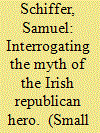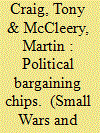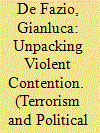|
|
|
Sort Order |
|
|
|
Items / Page
|
|
|
|
|
|
|
| Srl | Item |
| 1 |
ID:
190717


|
|
|
|
|
| Summary/Abstract |
This essay seeks to understand how since the signing of the Good Friday Agreement in 1998, marking the end of The Troubles in Northern Ireland, filmic depictions of the conflict reinterpret and interrogate the traditional role of the ‘hero’ in the Irish republican cause. In an analysis of two films released after the Good Friday Agreement, Hunger (2008) and The Wind that Shakes the Barley (2006), this essay argues that both films feature a hero-type Irish republican waging a brave-but-futile campaign against British oppression, but critique the myth of the Irish republican hero by severing the cycle of mythical violence by sowing doubt in the hero myth that serves as its base. This essay suggests that film is a low-stakes arena for the interrogation of volatile narratives that plays an important role in the reconceptualization of a conflict and, maybe even, its resolution.
|
|
|
|
|
|
|
|
|
|
|
|
|
|
|
|
| 2 |
ID:
134172


|
|
|
|
|
| Publication |
2014.
|
| Summary/Abstract |
A common criticism levelled at successive governments of the Republic of Ireland during the Northern Ireland 'Troubles' was their alleged inactivity in the face of a ferocious Provisional IRA campaign. Such criticisms were based in large part on the perception of the southern state as a supply base for militant republicanism. The Republic was undoubtedly a formidable logistics hinterland for such militants. However, criticisms of the reactions of authorities in the south are unfair. This article considers the explosives capabilities of the IRA during the first six years of their campaign. It does so with reference to their attempts to obtain commercial explosives as well as measures employed by them to obtain homemade explosives. The article also considers countermeasures employed by the southern government and reveals the extent to which they sought to shut down IRA capabilities in the south. It is argued that, ultimately, the IRA's campaign in this regard could only be contained and never unilaterally halted.
|
|
|
|
|
|
|
|
|
|
|
|
|
|
|
|
| 3 |
ID:
173848


|
|
|
|
|
| Summary/Abstract |
From March 1972 until internment itself was eventually abandoned in December 1975 successive Secretaries of State for Northern Ireland used their powers to arrest and release republican internees. This article demonstrates that several factors contributed to the policy of controlling the arrests and releases of internees, and that the most important was not negotiations with the Provisional IRA (PIRA) but the need to encourage the engagement of moderate nationalists in an emerging political process. The story of internment is often exclusively seen in the narrower narratives of paramilitary historiography and the later ‘prison war’. This article adopts a broader contextual approach in which both moderate nationalist, and to a lesser extent, unionist concerns over arrests and releases are considered. In doing so, this work resituates the gradual ending of internment at the heart of the mainstream political discussions in Northern Ireland in the 1970s. The article also contends that this controlled use of internment as a political strategy ultimately proved to be successful for the British government in achieving their desired objectives.
|
|
|
|
|
|
|
|
|
|
|
|
|
|
|
|
| 4 |
ID:
175742


|
|
|
|
|
| Summary/Abstract |
This paper systematically describes the different types of political violence that occurred in Northern Ireland between 1968 and 1972, examining how they interacted and fueled each other. To measure the level of political violence in Northern Ireland, traditional quantitative approaches use variables such as the number of conflict-related deaths, paramilitary attacks, or riots; the goal of this paper, instead, is to disaggregate acts of violent contention by actor, type, and target. Relying on Quantitative Narrative Analysis (QNA), all the violent actions perpetrated by the actors participating in the conflict have been recorded, coded, and analyzed. Three main types of violence in Northern Ireland are identified: a) protest-related violence—violent interactions among protesters, counterprotesters, and police before, during, and after mass demonstrations; b) sectarian violence—includes riots and clashes between members of the two main ethno-national communities; and c) armed conflict—violent actions by paramilitary groups and security forces. While originating from different conflict situations, these three types of violence affected each other, as they altered, and were altered by, the broader political context. Conceptual and methodological disaggregation of political violence are encouraged to better understand violent conflicts.
|
|
|
|
|
|
|
|
|
|
|
|
|
|
|
|
|
|
|
|
|